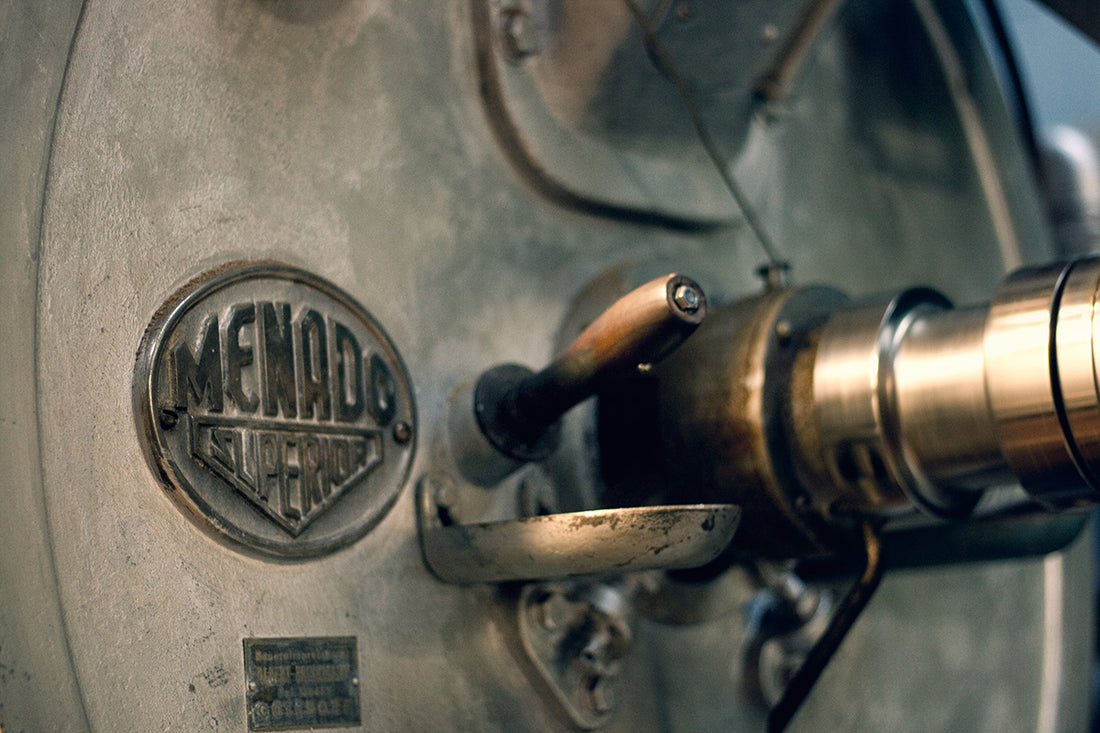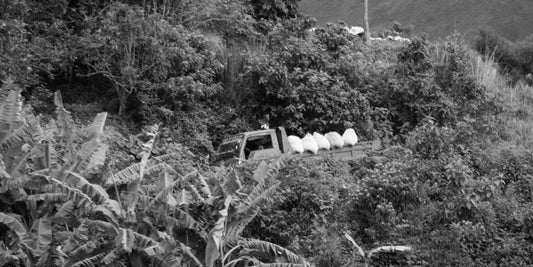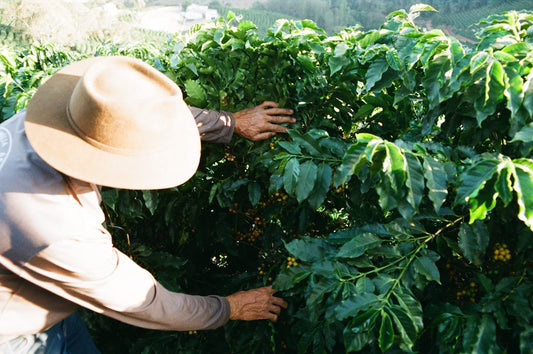
Looking back on five years of Roastworks
Roastworks is five years old this month. To celebrate, this week we’re looking back on how far we’ve come and giving you 5% off everything on the website with the code BIRTHDAY. Like all the best parties, it won’t last forever, so be quick to grab a birthday treat. Offer ends midnight 8th March 2020.
LOOKING BACK
A lot has changed since I started roasting coffee in the back of my parent’s coffee factory in 2015. As the child of two artisan roasters, I grew up surrounded by coffee sacks and beans. My parents were at the forefront of the Second Wave in artisan coffee when they started roasting in the late eighties, so I guess it was only natural that I too had a passion for coffee.
I started roasting on an absolute piece of crap 5-kilo roasting machine. It was called an STA Impianti and it was a direct flame Italian-made machine. I bought it with my own savings so I was simply looking for the cheapest machine I could find. It would start fires for a pastime and if you increased airflow the temperature would increase also (?) If I’m honest, the whole thing was a bit of a hobby at first, but feedback from other local coffee roasters, baristas and cafe owners was really positive. So, shortly after, my wife Caroline and I decided to create a brand and give it a shot. Roastworks was born.

Roastworks’ first coffee machine, the 5-kilo STA Impianti
To begin with, our vision was such a cliche. We’d say stuff like “we source the finest beans”, and “slow-roasted in small batches to reveal the coffee’s character”. One thing we always knew was that we wanted the company to have a strong brand. After hours of scrolling on Pinterest, the same designer kept cropping up – Richie Stewart based in Boston, Massachusetts. He specialises in hand-cut typography and logo design, and after a Skype call, we commissioned Richie to design Roastworks’ first logo. We were so stoked with how it turned out and we felt ready to give our brand a good push in the speciality coffee scene. In my past life, I was a graphic designer, so we designed our packaging in-house making use of Kraft bags (again, a cliche) with monochrome card labels stapled on, headed to a couple of food and drink shows and very quickly got our first listing in Wholefoods, who took our entire retail range. Nailed it.

Roastworks’ first logo, designed by Richie Stewart, 2015

Will & Caro at the Speciality & Fine Food Fair, 2015

Roastworks’ first packaging design, 2015
Our listing in Wholefoods gave us brand awareness beyond the South West and now we had a new group of regular Roastworks customers who loved the taste of our coffee. We launched our website where customers could buy from us direct, and they sure did! We quickly outgrew the 5-kilo roaster, so we purchased a Probat LG12 which was made in 1971 for our second roaster. It was the first proper production roaster we bought and it’s still going strong today, we use it mainly for our single origin coffees and Decaf.

Our second roaster, the Probat LG12 built in 1971
Soon after, M&S were on the lookout for coffee brands which showed provenance, and with ‘Devon, England’ sitting proudly in our logo, they quickly became our next (and biggest) customer. This was the point we realised that it was happening – we were actually going to have a viable speciality coffee business.
With the M&S order in, we had a bit more money in the bank. 2015 saw us move into our 3000 square-foot unit in Willand just outside Exeter. This move was to set us up for growth and ensure we will have enough room for all the new coffee and equipment we’d be buying over the next few years. We set up the roasting machines, added a partitioning, built ‘The Lab’ and stacked up loads of racking which, little did we know, would soon be filled. Things were moving pretty fast and we were both super excited about what the future would hold for Roastworks. We never set out to focus on grocery retail, but I suppose in the back of our mind we were always pushing our coffees towards opportunities where speciality coffee was under represented, and where there was a gap in the market. The local wholesale and cafe scene was pretty competitive and there were a handful of roasters doing a really good job, so we felt our efforts would be appreciated more in other market sectors.

The new roastery space, 2015

‘The Lab’ in the early days

Partitioning in the roastery
With the orders rolling in, we quickly needed more roasting capability. Suddenly the 12-kilo roaster wasn’t going to cut it anymore. In 2016 I decided that I would try and buy a bigger machine. I was hunting around for 20-30kg roasters and even got a quote for a Loring Smart Roast. I quickly realised my aspirations exceeded my financial capabilities. My parents had sold their roasting business a couple of years ago, but retained much of the production equipment, and I knew my dad had a 60kg Barth Menado in storage. I called him and asked if I could “have” it. He naturally obliged and I got it shipped to our roastery. The problem was that it hadn’t had any TLC for a very long time and it was in a terrible state. All the bearings were shot, the burner adjustment had seized. Cosmetically it was a mess too and there was rusty metal all over the place. I realised I need to refurbish it in order to use it.

The refurb of the Barth Menado
In January 2016 I began the refurb. I completely stripped the machine down and sent it to be shot blasted and painted black. I replaced every bearing, I overhauled the gas train, and all broken/worn or damaged components were replaced. I had planned for the work to take 3 months, but 6 months in I was still working on it. It was a slightly scary time. I was loading a van full of green coffee every week and driving up to Bristol and roasting it at Extract Coffee Roasters, loading all the roasted coffee back in the van and driving home. Sometimes there would be 1.5 tonnes of coffee in the van. It was intense. I have to say a big shout out to the team at Extract for their generosity and general good vibes. I couldn’t have done it without them. It was back-breaking work and gave me many sleepless nights, but in July 2016 the Barth was up and running smoothly and relatively quietly in comparison to before. The Barth is now the heart and soul of our roastery and influences the taste of our coffee, us as people, and even our future branding…

Before refurbishment

After refurbishment, July 2016
With the business in steady growth and key customers like M&S and Wholefoods making regular orders, we were planning our next move. We’d watched the rise of Nespresso capsules rapidly make their way into thousands of households in Europe. As third-wave coffee roasters, we didn’t rate it and saw it as an inferior way to brew coffee. I mean have you tasted those things? We would have laughed if you’d told us at the start of our journey that we’d actually champion this technology, but that’s exactly what we did. It all started when in 2016 Maxwell Colonna Dashwood brewed me a delicious Rwandan coffee at his cafe Colonna and Smalls. When he flippantly said, “that’s a Nespresso” I was blown away. Can Nespresso really taste this good? It got me thinking. Our mission is to get more people drinking and appreciating speciality coffee, and what better vehicle to help us do this than with Nespresso capsules? After months of R&D and many headaches later, we launched our very first range of Nespresso compatible capsules at London Coffee Festival 2016.

Launching Nespresso compatible capsules at London Coffee Festival, 2016
Our speciality Nespresso capsules caught the attention of tea and coffee buyers and in May 2017 we launched the full range of Nespresso compatible capsules, plus The Espresso Beans & Ground in Waitrose nationwide. This was the first major step in achieving our mission to engage more consumers in speciality coffee.

Roastworks launches in Waitrose nationwide, May 2017
Now that we had established ourselves as a retail coffee company with some key supermarket listings, we felt we needed to step our game. We hired a full-time roaster, Jack, and gave Roastworks a rebrand. We felt our packaging needed to work harder on the shelves to capture the attention of busy shoppers and position Roastworks as a high-quality premium brand. We got back on Skype with our good friend Richie and commissioned him to give the logo an upgrade. We took photos of each piece of typography on the newly-refurbished Barth roaster and sent them over to Richie for inspiration. He smashed it out of the park.
We knew that plastic was an unsustainable option for our Nespresso capsules and after a lot of research, learnt that aluminium was the most sustainable option in terms of recyclability and total carbon life cycle. In April 2018 we launched our new logo and packaging, as well as the new 100% recyclable aluminium capsules at London Coffee Festival.

Some of the team launching the new brand and aluminium Nespresso capsules at London Coffee Festival, 2018

New aluminium capsules and packaging launched April 2018

New packaging launched April 2018
With our new packaging out in the world and getting a great response, we launched all our products in Ocado in October 2018, and to help with the increased activity, hired Ed Greenall, our Head of Coffee Operations in June 2019.
In September 2019 we launched Singles Club, where we introduce customers to the most vivid and unique tasting coffees in the world. Many exceptional coffees land on our desk from importers and more often than not, we were ignoring them because they didn’t quite fit the brief, however delicious and mindblowing they were. The Singles Club is our new outlet to not put these amazing coffees to use and to show you how mental and wonderful speciality coffee can be.
In January 2020 Roastworks launched as a hero brand in a new speciality coffee category introduced by Holland & Barrett. With seven of our products, including our Nespresso compatible pods and pre-ground coffee from three origins now available in selected stores, this represents a huge leap forward for the industry and for us on our mission of engaging more consumers in speciality coffee.
WHERE NEXT?
We’ve learnt a thing or two since the 5-kilo STA Impianti days. Caroline and I now have a little girl, Ivy, and the Roastworks team has grown a bit too, with 5 full-time employees and we are currently recruiting for a full-time marketing person to join our team.
Five years may seem like a long time, especially when you compare your business to your competitors, but five years have gone quickly. We’re proud of what we’ve achieved so far, but we are still a young business with big ambitions. In the next five years, we will continue to deliver on our brand promise of making speciality coffee more accessible to everyone.




